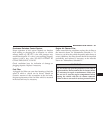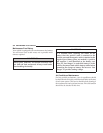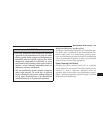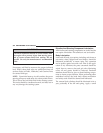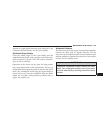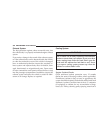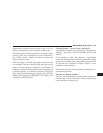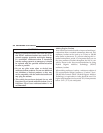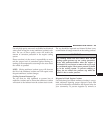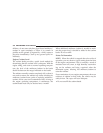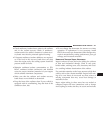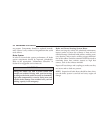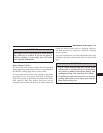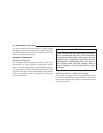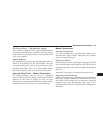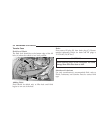
Use only high purity water such as distilled or deionized
water when mixing the water/antifreeze (coolant) solu-
tion. The use of lower quality water will reduce the
amount of corrosion protection in the engine cooling
system.
Please note that it is the owner’s responsibility to main-
tain the proper level of protection against freezing ac-
cording to the temperatures occurring in the area where
the vehicle is operated.
NOTE: Mixing antifreeze/coolant types will decrease
the life of the antifreeze/coolant and will require more
frequent antifreeze/coolant changes.
Cooling System Pressure Cap
The cap must be fully tightened to prevent loss of
antifreeze/coolant, and to insure that antifreeze/coolant
will return to the radiator from the coolant reserve tank.
The cap should be inspected and cleaned if there is any
accumulation of foreign material on the sealing surfaces.
WARNING!
The warning words DO NOT OPEN HOT on the
cooling system pressure cap are a safety precaution.
Never add antifreeze/coolant when the engine is
overheated. Do not loosen or remove the cap to cool
an overheated engine. Heat causes pressure to build
up in the cooling system. To prevent scalding or
injury, do not remove the pressure cap while the
system is hot or under pressure.
Disposal of Used Engine Coolant
Used ethylene glycol based antifreeze/coolant is a regu-
lated substance requiring proper disposal. Check with
your local authorities to determine the disposal rules for
your community. To prevent ingestion by animals or
MAINTAINING YOUR VEHICLE 369
7



